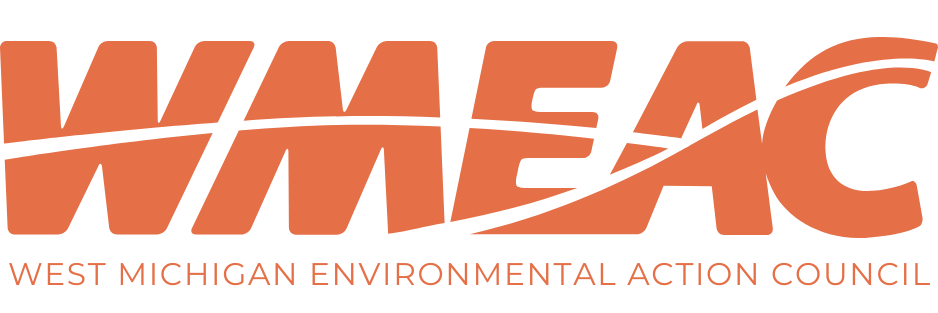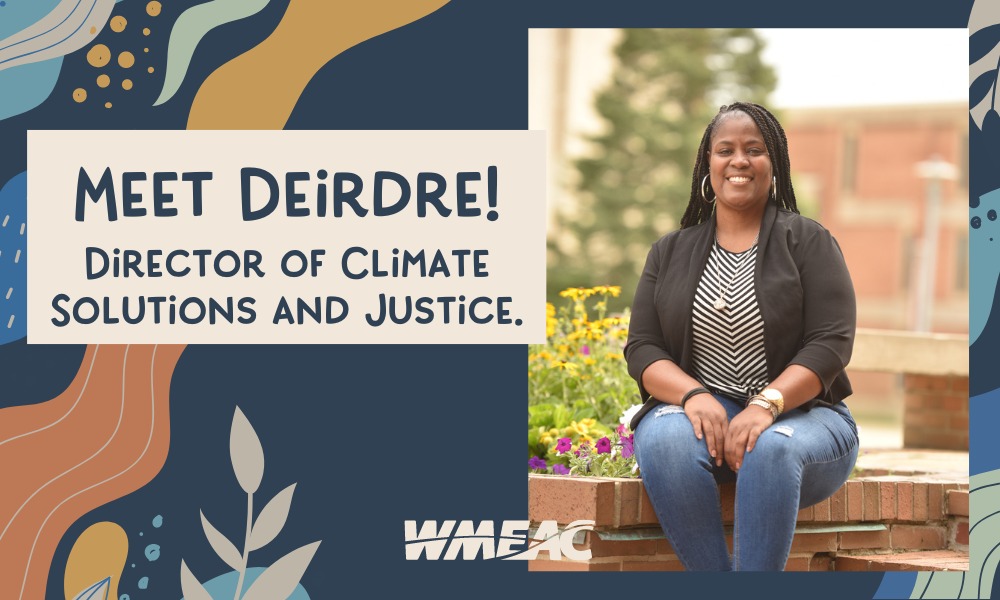By: Kelly Otterness
This Earth Month, we are delighted to introduce you to Deirdre Courtney Nieves. Deirdre recently joined WMEAC to direct today’s climate solutions and justice initiatives throughout Southwestern Michigan. Previously, she served as a team leader for the Empower Michigan leadership team, as an IDEAL committee member, and on WMEAC’s ACT policy focused committee. Her work centers on energy justice, democracy, volunteering, and engaging in climate discussions and policy work. Deirdre is excited to lead our partnership with the National Climate Action Campaign (CAC) starting this year.
Deirdre comes to WMEAC as an environmental justice professional, educator, and advocate for climate change displacement and marginalized populations. She has explored climate change impacts on plant communities, conducted ethnographic fieldwork in collaboration with First Nations communities, and designed courses related to climate change, environmental studies, and sustainability. In January, WMEAC named her its Director for Climate Solutions and Justice.
Q: What motivates you to pursue this challenging work?
As a lifelong Michigander, I have a concern for natural spaces, biodiversity, Great Lakes, polluted spaces, and African American communities. My intersectional identities and first hand experiences with these issues compel me to represent those most impacted by crises such as biodiversity loss, climate change and land degradation.
As an educator by nature, I am passionate about empowering and supporting those who are most vulnerable. It is important to me to center the voices of those who carry the heaviest burdens from this climate crisis, particularly African American women, youth, and people of color. We must stand for the human rights of all people equally. In my work at WMEAC, I strive to inspire more individuals from underrepresented communities to engage in climate solutions and justice work.
Q: Tell me about your background before joining the WMEAC staff.
Much of my work centers around educating students, teachers, administrators and community members on issues related to climate change, cultural and environmental justice studies. I consider myself an environmental justice advocate and social scientist. My research centers on understanding the complexities and intersections between climate change displacement, marginalized populations, and environmental justice.
Prior to this year, my work with WMEAC included community engagement around these issues, working on the IDEAL and ACT committees, and several speaking engagements related to climate change, public policy engagement, and environmental justice.
Q: What attracted you to the Director for Climate Solutions and Justice position at WMEAC?
WMEAC is West Michigan’s preeminent resource for environmental education and advocacy. We partner with environmental organizations across the country to advocate for sound, science-based environmental policy at the state, regional, and national levels. WMEAC has a long history of inclusive actions and concern for marginalized peoples. Recently, they have put a lot of work into increasing visibility for marginalized groups within the organization. I am the first African American female in this particular position at WMEAC and am part of a new wave of minorities becoming visible in environmental spaces. My goal is to help that wave of visibility to grow.
Not everyone will come to this work through science, but also through other intersectional environmental approaches. WMEAC’s mission has long been to collaborate with a diverse community to educate, engage, and advocate for environmental values, environmental and climate justice. My background as an educator and my concern for the environment and vulnerable groups makes this position a natural fit. Our nation has a long history of environmental (in)justice, experiencing environmental racism and receiving disproportionate impacts of environmental hazards, especially in low-income communities and communities of color.
Recently, the Environmental Justice Movement commemorated 30 years, and new BIPOC leaders are emerging daily in Southwest Michigan and throughout the country to expand environmental organizations like WMEAC.
Q: How have you been adjusting to your new position?
There is much work to be done in this space, and due to the urgency, we need to act now. One challenge has been getting others on board. I therefore absolutely love this new role as it allows me to work on a new partnership between WMEAC, the Climate Action Campaign (CAC), and a coalition of other major national environmental, environmental justice, and public health organizations. The campaign is leveraging partners’ strong brands and membership to win bold federal action on equitable climate change solutions.
Q: What are the Climate Action Campaign’s goals?
CAC has two primary campaigns. The first is Solutions for Pollution, which calls on the Biden Administration to go big on climate and public health by advancing approximately 20 key protections across federal agencies.
The second is the Climate Wins Here campaign to educate the public and key stakeholders on the many local benefits of climate investments in the Inflation Reduction Act and the Bipartisan Infrastructure Law. This is a long-term campaign to change the politics of climate change by helping voters and elected officials see the benefits of investing in climate solutions.
Q: Is there anything in particular that you are enjoying about working here?
I truly enjoy working with each of the staff members. This is a collaborative group! Everyone is passionate about the environment and the people that we serve. In this position, I truly feel as though I can bring my whole self and that my contributions and background are valued.
Q: Can you share what you have learned as Director for Climate Solutions and Justice from other staff members at WMEAC?
During my time here, I have learned that WMEAC valuescentering BIPOC voices. We are working to increase representation and agency within the organization and the community. I have also learned from my colleagues the significance of collaborative work. Together, we are building relationships with diverse stakeholders to reach a sustainable future.
Q: What are your goals for your time at WMEAC?
My ultimate goal is to inspire and empower more individuals from diverse backgrounds to get involved in this critical work. I believe we all have a moral obligation to protect our planet and leave a habitable planet for future generations. In the coming months, I will increase our Climate Action Campaign efforts, advocate for federal carbon rules and legislation, and amplify the voices of those most impacted by the climate crisis.
WMEAC is thrilled to support Deirdre’s climate change and environmental justice work in her new role. Stay tuned to our Instagram and Facebook posts this spring for ways you can make a difference!


